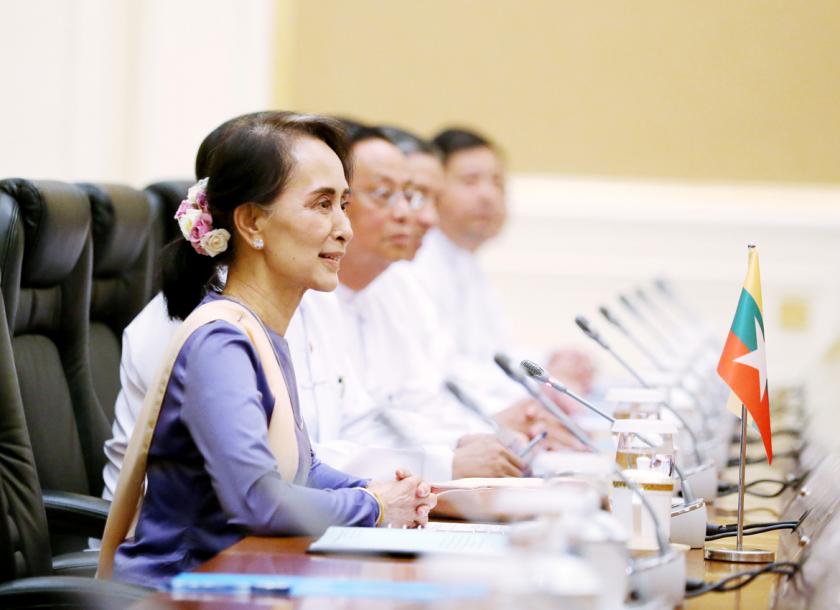Myanmar: Reviewing the economy in 2017
The economy of Myanmar is set to continue gaining momentum in the near and medium term while the slow pace of economic reforms has led to a drop of investor confidence, according to the Oxford Business Group. This growth is anticipated to take place despite concerns over the slow pace of economic reforms and the Rakhine crisis.
The International Monetary Fund (IMF) released a forecast in November that the country’s economy is expected to grow by 6.7 percent in this current fiscal year, which lasts until March. The figure is considerably above the 5.9pc growth secured in the preceding fiscal year, and well above the IMF’s prediction of 5.1pc expansion across Southeast Asia in 2017.
Agriculture and manufacturing
Agriculture continues to recover from the weather disruption in the last fiscal year and the sector will play a significant part in the economic growth. World Bank data suggested that the sector accounts for 38pc of GDP, 23pc of exports and employing some 60pc of the country’s workforce.
Increased demand abroad for domestically-made garments and light-manufactured products and risen domestic demand for consumer goods have also boosted economic growth in recent years. Asian Development Bank (ADB) data show that imports of consumer goods and intermediate goods rose by 54pc and 20pc, respectively, between April and July 2017.
The IMF anticipates annual GDP growth to increase by between 7-7.5pc in the medium term.
There have been concerns that ongoing Rakhine crisis could affect and deter capital inflows and foreign direct investment (FDI).
Rising levels of demand has led to higher consumer prices. The ADB recorded inflation of 6.8pc for 2016, and predicts year-end rates of 7pc and 7.5pc for 2017 and 2018 respectively.
Such a rate remains significantly higher than the ASEAN regional averages of 3.1pc for these two years.
Slow pace of reforms concerns businesses
Despite the overall positive outlook, the business community have raised concerns over the slow pace of economic reforms and in implementing those reforms.
A December 2017 survey carried out by the Union of Myanmar Federation of Chambers of Commerce and Industry (UMFCCI) and consultancy firm Roland Berger found a significant fall in confidence among the business community.
The percentage of those with positive short-term business sentiment fell from 73pc in late 2016 to 49pc, according to the publication. Respondents cited a lack of clarity in economic policy from Nay Pyi Taw as a significant reason behind the drop in confidence.
Peter Beynon, chair of the British Chamber of Commerce in Myanmar, told Oxford Business Group that while progress has been promising, more actions need to be taken to support economic growth.
“In order to improve its business environment, the government needs to accelerate the pace of economic liberalisation. In particular, the executive should focus on promoting a faster liberalisation of sectors such as insurance, banking, non-banking financial institutions and microfinance.
“However, liberalisation has to be accompanied by the implementation of the right set of regulations,” he noted.
Despite the government’s commitment to propel Myanmar’s ranking in the World Bank’s ease of doing business index into the top 100 within three year, the country has seen a drop of one place in 2018, being placed 171st out of 190 economies surveyed.
New Companies Law to boost investment
In spite of the slow pace of reform, the country has taken a few major steps forward in improving its investor environment.
The new Companies Law, approved in December and set to be implemented within half a year, will allow foreign investors to invest up to 35pc of shares in a local company. This marks a difference from the current regulation, where local companies designed by the law does not allow any foreign investments. Legally defined foreign companies have severe restrictions on property and asset ownership comparatively.
Nay Pyi Taw hopes that the new legislation, together with the recently enacted new Investment Law, will further improve the investment climate and scale up inwards investments this year into sectors prioritised by the government.
Source: https://www.mmtimes.com/news/reviewing-economy-2017.html


 Thailand
Thailand




